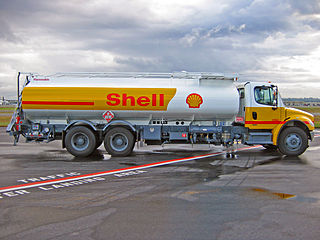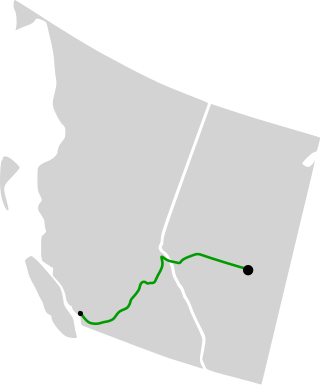
Avgas is an aviation fuel used in aircraft with spark-ignited internal combustion engines. Avgas is distinguished from conventional gasoline (petrol) used in motor vehicles, which is termed mogas in an aviation context. Unlike motor gasoline, which has been formulated without lead since the 1970s to allow the use of catalytic converters for pollution reduction, the most commonly used grades of avgas still contain tetraethyl lead, a toxic lead containing additive used to increase octane rating and prevent engine knocking. There are ongoing efforts to reduce or eliminate the use of lead in aviation gasoline.

Oil sands, tar sands, crude bitumen, or bituminous sands, are a type of unconventional petroleum deposit. Oil sands are either loose sands or partially consolidated sandstone containing a naturally occurring mixture of sand, clay, and water, soaked with bitumen, a dense and extremely viscous form of petroleum.

The Athabasca oil sands, also known as the Athabasca tar sands, are large deposits of bitumen, a heavy and viscous form of petroleum, located in northeastern Alberta, Canada. These reserves are one of the largest sources of unconventional oil in the world, making Canada a significant player in the global energy market.

Husky Energy Inc. was a Canadian company engaged in hydrocarbon exploration, headquartered in Calgary, Alberta, Canada. It operated in Western and Atlantic Canada, the United States and the Asia Pacific region, with upstream and downstream business segments. In the 2020 Forbes Global 2000, Husky Energy was ranked as the 1443rd-largest public company in the world.

Aviation fuels are petroleum-based fuels, or petroleum and synthetic fuel blends, used to power aircraft. They have more stringent requirements than fuels used for ground use, such as heating and road transport, and contain additives to enhance or maintain properties important to fuel performance or handling. They are kerosene-based for gas turbine-powered aircraft. Piston-engined aircraft use leaded gasoline and those with diesel engines may use jet fuel (kerosene). By 2012, all aircraft operated by the U.S. Air Force had been certified to use a 50-50 blend of kerosene and synthetic fuel derived from coal or natural gas as a way of stabilizing the cost of fuel.

Imperial Oil Limited is a Canadian petroleum company. It is Canada's second-largest integrated oil company. It is majority-owned by American oil company ExxonMobil, with a 69.6% ownership stake in the company. It is a producer of crude oil, diluted bitumen, and natural gas. Imperial Oil is one of Canada's major petroleum refiners and petrochemical producers. It supplies Esso-brand service stations.

Strathcona County is a specialized municipality in the Edmonton Metropolitan Region within Alberta, Canada between Edmonton and Elk Island National Park. It forms part of Census Division No. 11.

Suncor Energy is a Canadian integrated energy company based in Calgary, Alberta. It specializes in production of synthetic crude from oil sands. In the 2020 Forbes Global 2000, Suncor Energy was ranked as the 48th-largest public company in the world.

Petroleum production in Canada is a major industry which is important to the overall economy of North America. Canada has the third largest oil reserves in the world and is the world's fourth largest oil producer and fourth largest oil exporter. In 2019 it produced an average of 750,000 cubic metres per day (4.7 Mbbl/d) of crude oil and equivalent. Of that amount, 64% was upgraded from unconventional oil sands, and the remainder light crude oil, heavy crude oil and natural-gas condensate. Most of the Canadian petroleum production is exported, approximately 600,000 cubic metres per day (3.8 Mbbl/d) in 2019, with 98% of the exports going to the United States. Canada is by far the largest single source of oil imports to the United States, providing 43% of US crude oil imports in 2015.

Canada's oil sands and heavy oil resources are among the world's great petroleum deposits. They include the vast oil sands of northern Alberta, and the heavy oil reservoirs that surround the small city of Lloydminster, which sits on the border between Alberta and Saskatchewan. The extent of these resources is well known, but better technologies to produce oil from them are still being developed.
The Shell Scotford Upgrader is an oilsand upgrader, a facility which processes crude bitumen from oil sands into a wide range of synthetic crude oils. The upgrader is owned by Athabasca Oil Sands Project (AOSP), a joint venture of Shell Canada Energy (60%), Marathon Oil Sands L.P. (20%) and Chevron Canada Limited (20%). The facility is located in the industrial development of Scotford, just to the northeast of Fort Saskatchewan, Alberta in the Edmonton Capital Region.

Alberta's Industrial Heartland is the largest industrial area in Western Canada and a joint land-use planning and development initiative between five municipalities in the Edmonton Capital Region to attract investment in the chemical, petrochemical, oil, and gas industries to the region. It is "home to more than 40 petrochemical companies" and is one of Canada's largest petrochemical processing regions." By July 2015 there was $13 billion invested in new industrial projects providing employment for 25,000 in the Alberta's Industrial Heartland.

Refinery Row is the unofficial name given to the concentration of oil refineries in west Sherwood Park, Strathcona County, Alberta, just east of the city of Edmonton.

Although there are numerous oil companies operating in Canada, as of 2009, the majority of production, refining and marketing was done by fewer than 20 of them. According to the 2013 edition of Forbes Global 2000, canoils.com and any other list that emphasizes market capitalization and revenue when sizing up companies, as of March 31, 2014 these are the largest Canada-based oil and gas companies.
Cenovus Energy Inc. is a Canadian integrated oil and natural gas company headquartered in Calgary, Alberta. Its offices are located at Brookfield Place, having completed a move from the neighbouring Bow in 2019.
The Cenovus Lloydminster Refinery is an asphalt refinery located in the city of Lloydminster, Alberta, Canada owned by Husky Energy. The refinery provides oil products, primarily 30 different grades of asphalt, as well as light distillate, kerosene distillate, atmospheric gas oil, light vacuum gas oil (VGO), and heavy vacuum gas oil. This refinery is Canada's largest asphalt supplier, processing 27,000 barrels of heavy crude oil per day to produce asphalt. Husky is the "largest marketer of paving asphalt in Western Canada with a 29 mbbls/day capacity asphalt refinery located at Lloydminster, Alberta "integrated with the local heavy oil production, transportation and upgrading infrastructure."
Western Canadian Select (WCS) is a heavy sour blend of crude oil that is one of North America's largest heavy crude oil streams and, historically, its cheapest. It was established in December 2004 as a new heavy oil stream by EnCana, Canadian Natural Resources, Petro-Canada and Talisman Energy. It is composed mostly of bitumen blended with sweet synthetic and condensate diluents and 21 existing streams of both conventional and unconventional Alberta heavy crude oils at the large Husky Midstream General Partnership terminal in Hardisty, Alberta. Western Canadian Select—the benchmark for heavy, acidic crudes—is one of many petroleum products from the Western Canadian Sedimentary Basin oil sands. Calgary-based Husky Energy, now a subsidiary of Cenovus, had joined the initial four founders in 2015.

The Trans Mountain Pipeline System, or simply the Trans Mountain Pipeline (TMPL), is a multiple product pipeline system that carries crude and refined products from Edmonton, Alberta, to the coast of British Columbia, Canada.
The Sturgeon Refinery also NWR Sturgeon Refinery is an 80,000 bbl/d (13,000 m3/d) crude oil upgrader—built and operated by North West Redwater Partnership (NWRP) in a public-private partnership with the Alberta provincial government. It is located in Sturgeon County northeast of Edmonton, Alberta, in Alberta's Industrial Heartland. Premier Jason Kenney announced on July 6, 2021, that the province of Alberta had acquired NWRP's equity stake, representing 50% of the $10-billion project, with the other 50% owned by Canadian Natural Resources.










